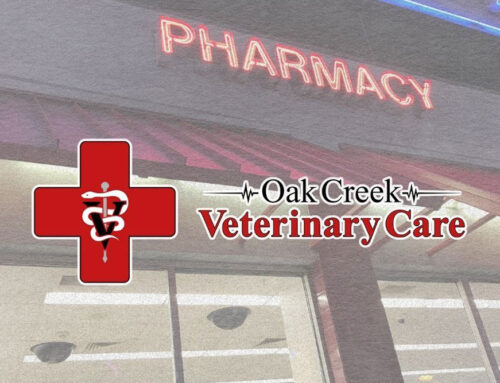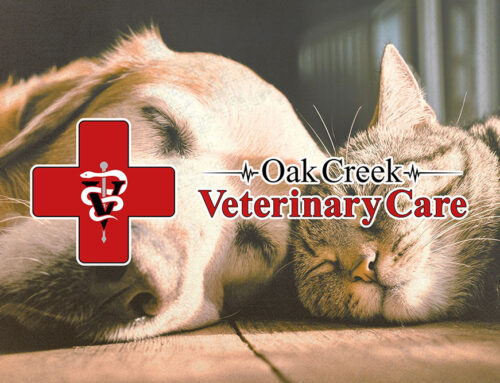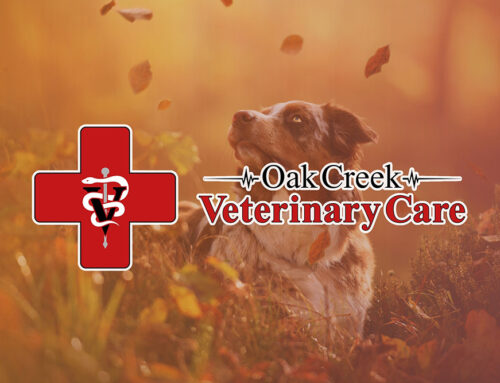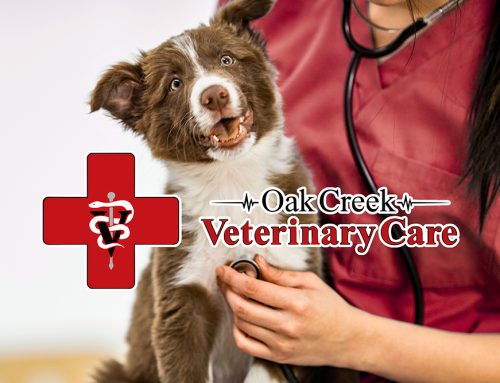Pet ownership’s benefits are numerous, including improved physical health, lower blood pressure, and the ability to better cope with life’s stressors. In addition, numerous working pets have been specially trained to perform a variety of service jobs, including leading the blind, sniffing out bombs, and protecting people during seizures.
With everything that pets do for us, the least we can do for them is support their health and wellness throughout their lives. Our Oak Creek Veterinary Care team explains how you can support your pet’s health and wellbeing, helping make their senior years truly golden.
#1: Staying active with your senior pet
You don’t have to go running with your senior dog or have epic play sessions with your aged indoor cat, but you should set aside some time each day for movement. Low-impact, controlled exercise, such as a walk or gentle play, helps keep your pet’s weight down, improve their muscle strength, combat arthritis pain, and reduce their cognitive decline risk.
#2: Providing your senior pet with high-quality nutrition
Your pet’s diet is extremely important during their golden years. Senior pets should eat nutrient-dense foods that have been adapted to help maintain a healthy weight. Many senior pets can benefit from therapeutic or prescription diets to combat chronic health issues, such as kidney disease, a sensitive gastrointestinal (GI) tract, pancreatitis, diabetes, heart problems, urinary tract disease, or arthritis. To determine the best diet for your senior pet, talk with our Oak Creek Veterinary Care team.
#3: Keeping your senior pet mentally stimulated
The adage, “You can’t teach an old dog new tricks,” is completely false. You can and should teach old dogs and cats new tricks! Training sessions are a great way to keep your furry pal engaged and mentally sharp. Scent work is a favorite low-impact activity that dogs find stimulating. Try enticing your cat to play with a wand toy or install a window perch so your feline friend can watch the birds outside. To encourage your dog or cat to problem-solve and work for their meal, serve their kibble in a food puzzle.
#4: Making home adjustments for your senior pet’s comfort and safety
To help support your senior pet, make adjustments to your home. For your elderly cat, place a low-sided litter box on each of your home’s levels. For your aged dog, place rugs and runners on slick floors to greatly increase their confidence and safety. Gate off stairs if your pet is unsteady, and keep comfortable, warm beds in multiple rooms, so a resting spot is never too far away.
#5: Visiting the veterinarian for your senior pet’s wellness care
Veterinary visits are crucial for older pets because new problems can crop up quickly. Plan to visit our Oak Creek Veterinary Care team for your senior pet’s checkups at least twice a year and more often if they have a medical condition. To monitor their organ function, ensure your elderly four-legged friend has annual wellness screening tests. To prevent your pet from contracting infectious or parasitic diseases, vaccines and parasite control should be administered throughout their life.
#6: Maintaining your senior pet’s dental health
You may think dental health is the least of your aging pet’s problems, but dental disease can really diminish their quality of life. An untreated dental infection is painful, and an older pet’s immune function may be ineffective, allowing an infection to rage out of control or spread through their bloodstream, damaging vital organs. Keeping up with dental home care, including daily toothbrushing, is the best way to keep your pet’s mouth healthy and reduce their need for professional anesthetized cleanings.
#7: Reducing your senior pet’s stress

You might be tempted to adopt a new pet to help perk up your older pet, but think carefully before you do this. A new household pet may cause your senior pet to feel anxious, and they may withdraw rather than playfully interact. If your pet’s personality allows for a new addition, go for it, but if they usually prefer to spend most days by themself, let them be.
#8: Monitoring your senior pet’s quality of life
Senior pets often develop medical conditions that can cause their quality of life to decline. Our veterinary team can help you regularly assess your furry pal’s quality of life and recommend steps you can take to ameliorate any new issues.
Your senior pet has stood by your side for many years, now it’s time for you to stand by theirs. Follow our tips to help keep your four-legged friend healthy and happy well into their golden years. Schedule your aged pet’s regular biannual checkups with our Oak Creek Veterinary Care team and learn additional tips for providing the best care for your aging pet.







Leave A Comment